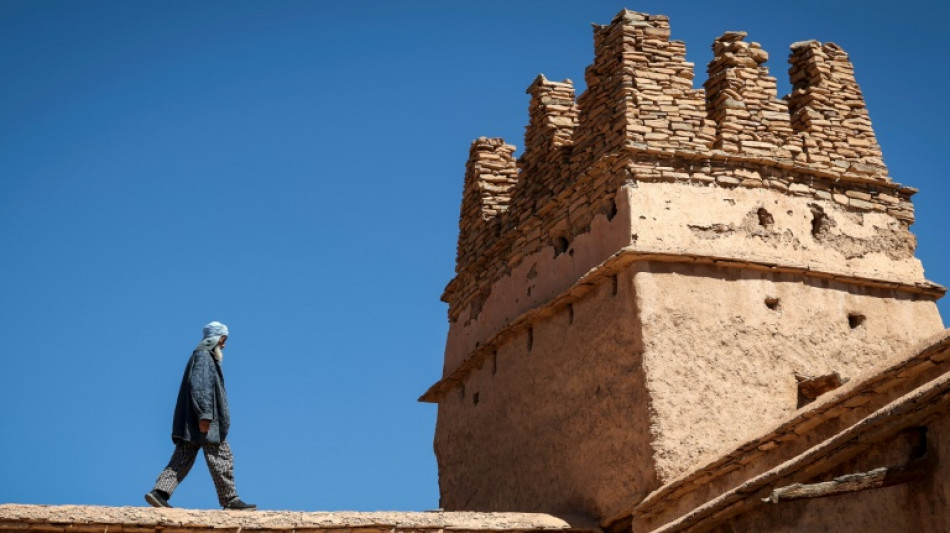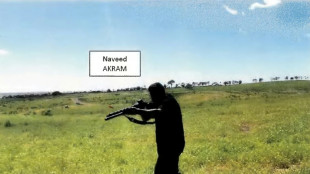
-
 Thailand says Cambodia agrees to border talks after ASEAN meet
Thailand says Cambodia agrees to border talks after ASEAN meet
-
Alleged Bondi shooters conducted 'tactical' training in countryside, Australian police say

-
 Swiss court to hear landmark climate case against cement giant
Swiss court to hear landmark climate case against cement giant
-
Knicks' Brunson scores 47, Bulls edge Hawks epic

-
 Global nuclear arms control under pressure in 2026
Global nuclear arms control under pressure in 2026
-
Asian markets rally with Wall St as rate hopes rise, AI fears ease

-
 Jailed Malaysian ex-PM Najib loses bid for house arrest
Jailed Malaysian ex-PM Najib loses bid for house arrest
-
Banned film exposes Hong Kong's censorship trend, director says

-
 Duffy, Patel force West Indies collapse as NZ close in on Test series win
Duffy, Patel force West Indies collapse as NZ close in on Test series win
-
Australian state pushes tough gun laws, 'terror symbols' ban after shooting

-
 A night out on the town during Nigeria's 'Detty December'
A night out on the town during Nigeria's 'Detty December'
-
US in 'pursuit' of third oil tanker in Caribbean: official

-
 CO2 soon to be buried under North Sea oil platform
CO2 soon to be buried under North Sea oil platform
-
Steelers edge Lions as Bears, 49ers reach playoffs

-
 India's Bollywood counts costs as star fees squeeze profits
India's Bollywood counts costs as star fees squeeze profits
-
McCullum admits errors in Ashes preparations as England look to salvage pride

-
 Pets, pedis and peppermints: When the diva is a donkey
Pets, pedis and peppermints: When the diva is a donkey
-
'A den of bandits': Rwanda closes thousands of evangelical churches

-
 Southeast Asia bloc meets to press Thailand, Cambodia on truce
Southeast Asia bloc meets to press Thailand, Cambodia on truce
-
As US battles China on AI, some companies choose Chinese

-
 AI resurrections of dead celebrities amuse and rankle
AI resurrections of dead celebrities amuse and rankle
-
Heirs Energies Agrees $750m Afreximbank Financing to Drive Long-Term Growth

-
 Black Book Poll: "Governed AI" Emerges as the Deciding Factor in 2026 NHS Procurement
Black Book Poll: "Governed AI" Emerges as the Deciding Factor in 2026 NHS Procurement
-
Hemogenyx Pharmaceuticals PLC Announces Update on Admission of Shares

-
 Pantheon Resources PLC Announces Shareholder Letter and Corporate Update on Dubhe-1
Pantheon Resources PLC Announces Shareholder Letter and Corporate Update on Dubhe-1
-
Tocvan Begins Trenching Material for the Pilot Mine and Pushes Ahead With Infrastructure Development

-
 Steelers receiver Metcalf strikes Lions fan
Steelers receiver Metcalf strikes Lions fan
-
Morocco coach 'taking no risks' with Hakimi fitness

-
 Gang members given hundreds-years-long sentences in El Salvador
Gang members given hundreds-years-long sentences in El Salvador
-
Chargers, Bills edge closer to playoff berths

-
 Gang members given hundred-years-long sentences in El Salvador
Gang members given hundred-years-long sentences in El Salvador
-
Hosts Morocco off to winning start at Africa Cup of Nations

-
 No jacket required for Emery as Villa dream of title glory
No jacket required for Emery as Villa dream of title glory
-
Amorim fears United captain Fernandes will be out 'a while'

-
 Nigerian government frees 130 kidnapped Catholic schoolchildren
Nigerian government frees 130 kidnapped Catholic schoolchildren
-
Captain Kane helps undermanned Bayern go nine clear in Bundesliga

-
 Captain Kane helps undermanned Bayern go nine clear
Captain Kane helps undermanned Bayern go nine clear
-
Rogers stars as Villa beat Man Utd to boost title bid

-
 Barca strengthen Liga lead at Villarreal, Atletico go third
Barca strengthen Liga lead at Villarreal, Atletico go third
-
Third 'Avatar' film soars to top in N. American box office debut

-
 Third day of Ukraine settlement talks to begin in Miami
Third day of Ukraine settlement talks to begin in Miami
-
Barcelona's Raphinha, Yamal strike in Villarreal win

-
 Macron, on UAE visit, announces new French aircraft carrier
Macron, on UAE visit, announces new French aircraft carrier
-
Barca's Raphinha, Yamal strike in Villarreal win

-
 Gunmen kill 9, wound 10 in South Africa bar attack
Gunmen kill 9, wound 10 in South Africa bar attack
-
Allegations of new cover-up over Epstein files

-
 Atletico go third with comfortable win at Girona
Atletico go third with comfortable win at Girona
-
Schwarz breaks World Cup duck with Alta Badia giant slalom victory

-
 Salah unaffected by Liverpool turmoil ahead of AFCON opener - Egypt coach
Salah unaffected by Liverpool turmoil ahead of AFCON opener - Egypt coach
-
Goggia eases her pain with World Cup super-G win as Vonn takes third


Moroccan villagers keep communal store tradition alive
Surrounded by olive and palm trees in a Moroccan mountain village, a centuries-old collective granary preserves the ancient practices of the Amazigh culture.
"The traditions are vanishing, but not here," said proud village elder Hossine Oubrahim, in Ait Kine in the Anti-Atlas mountains.
High in the rugged hills some 460 kilometres (280 miles) south of the capital Rabat, Ait Kine is home to one of country's few remaining collective granaries called agadir in Amazigh, Morocco's Berber language.
The imposing, fully functional structure, likely built in the 18th century and restored in 2012, is still used by local residents to store and protect their produce.
"We were raised on the tradition of storing our grains, dried fruit, oil and valuables there," recalled Oubrahim, in his 70s and wearing an indigo-coloured tunic.
"And we continue to respect it."
The village's granary is a "monument" that "represents our community spirit", said Abdelghani Charai, a 60-year-old merchant who returned to his ancestral home in Ait Kine after years away.
- Grains, fruit, family archives -
The granary, built using a practice known as rammed earth, sits in the village centre, protected by a fortified wall with a stone watchtower.
In the past, during times of unrest and rebellion against the government, it offered a safe place for storage, Charai explained.
"The granary guaranteed security," he said.
Inside, 76 cubicles are arranged in three levels around an open courtyard with a water cistern.
The agadir has stocks of barley, dates and almonds, but it is also used to safeguard documents like marriage and birth certificates, religious texts and contracts, and recipes for traditional medicine inscribed on palm stems.
Lahcen Boutirane, the guardian of the collective storeroom, said the village's 63 remaining families use it.
"Others have left, but they keep their archives here," he told AFP.
Unwritten laws have kept these granaries sacred and inviolable spaces, not only storing crops to use in drought but also protecting them from attacks, said archaeologist Naima Keddane.
Boutirane stressed the importance of preserving Ait Kine's agadir, which "bears witness to our ancestors' ingenuity".
- 'Solidarity' -
Collective granaries can be found elsewhere in North Africa -- in Algeria's Aures mountains, Tunisia's south and Libya's Nafusa mountains -- but they are most common in Morocco, though many are no longer in use.
The kingdom has more than 550 ancient igoudar -- the plural of agadir -- according to the culture ministry, which is preparing a UNESCO World Heritage nomination.
They are located primarily across central and southern Morocco, in caves or on cliff sides, on hilltops and in valleys.
"The challenge is to save Morocco's collective granaries, which have almost disappeared in Algeria, Tunisia and Libya," said architect and anthropologist Salima Naji.
Passionate about these "institutions of solidarity", she had helped restore Ait Kine's agadir, now an attraction for both researchers and tourists.
A group of Italian visitors appreciated the carved wooden door, adorned with forged iron.
"We are doing a tour of granaries," said guide Emanuele Maspoli, describing them as "extraordinary places that attest to the historical wealth of Morocco's oases".
"It's a magical place," said tourist Antonella Dalla.
Ch.Havering--AMWN



